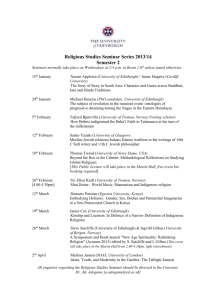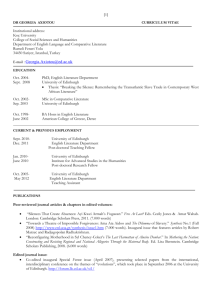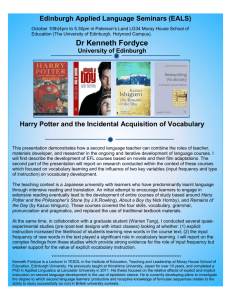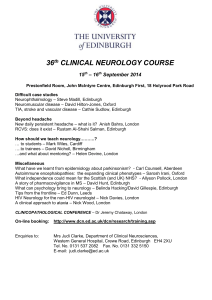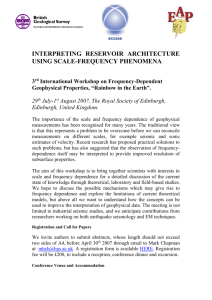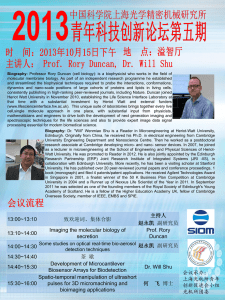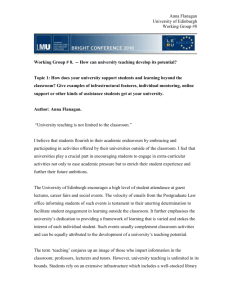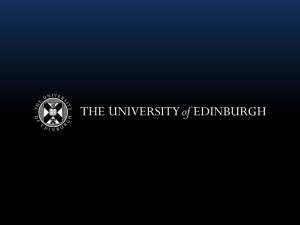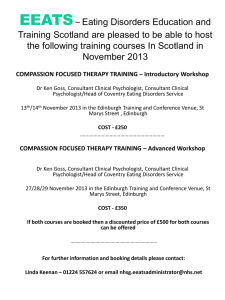slides
advertisement
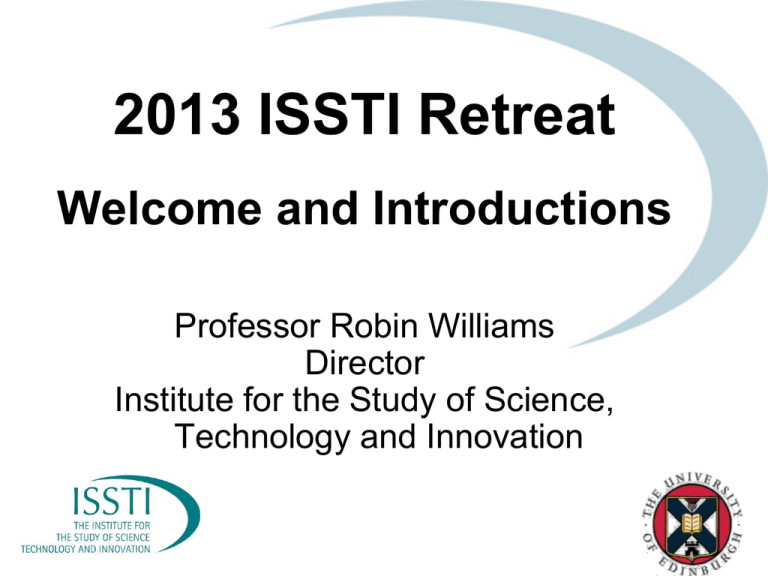
2013 ISSTI Retreat Welcome and Introductions Professor Robin Williams Director Institute for the Study of Science, Technology and Innovation Overview • Welcome • Role of ISSTI retreat • Brief history of ISSTI/Science, Technology & Innovation Studies @ Edinburgh • Introductions • Housekeeping announcements? • Where we are going? – issues to think about for closing discussion Role of ISSTI retreat • Opportunity to recharge our batteries • Chance for interaction and reflection in an intellectually safe and playful space • Find out more about each others’ work overcome tendency to fragment around differing substantive focus/analytical traditions • Identify the hot ideas - analytical challenges and emerging debates • Day 1: Evaluation theme (also PhD session) • Explore commonalities and synergies – theoretical, methodological, substantive Day 2: Encounters and Interactions • Hope other linkages - serendipitous as well as planned - will emerge in course of retreat A Brief History of Science, Technology and Innovation Studies @ Edinburgh Science Studies Unit • 1964 Science Studies Unit established by David Edge, with Barry Barnes and David Bloor • Strong programme in sociology of scientific knowledge “the Edinburgh School” • Work on history and sociology of science and medicine Technology Studies Programme • The social shaping of technology (MacKenzie & Wajcman 1985 • 1986 Robin Williams: coordinator of socio-economic research on technology, Interdisciplinary programme hosted by Research Centre for Social Sciences • Centre under ESRC Programme on Information & Communications Technologies (1987-95) • Extension to other areas: energy/environment; life science etc Formation of ISSTI • ISSTI formed in 2000 to bring together specialist research centres School of Social and Policy Studies Research Centre for Social Sciences Science Studies Unit Management School and Economics Entrepreneurship and Innovation Group ; Japanese European Technology Studies • To grow and sustain dynamic research community • To present a critical mass to external audiences – academic, research funders, external stakeholders Subsequent consolidation • 2008 colocation and then merger of Science Studies Unit and RCSS to form Science, Technology & and Innovation Studies subject group • Wider expansion of Science, Technology & and Innovation Studies – proliferation and growth of centres and groups across the university – account for about half our total strength • Recent wave of new appointments Interlocking programmes • Interlocking research programmes across a number of fields – Life Science –major ESRC investments Innogen and Genomics Forum Information and Communication Technologies;: Social Informatics Cluster; Digital Economy Network Energy & Environment; History of Science, Technology & Medicine etc. Other areas eg defence, nanotech, fire, finance Linked by cross-cutting concerns eg expertise, risk governance, engagement, interdisciplinarity • ISSTI becomes a network of networks – cutting across discipline-based university structures Distinctive position A • • • • distinctive tradition of work that is: empirically rich; theoretically innovative; engaged with policy and practice; and, highly interdisciplinary • leading centre in Scotland for STI studies • UK peers Sussex, Manchester, Lancaster? EU/worldwide top 10? • strong international reputation/collaborations, collaboration agreements renewed with Chinese Academy of Science; signed with Sharif University of Technology, Iran, being developed with Seoul National University Imperial College Business School Subject Categories of citations Sussex SPRU Subject Categories of citations Manchester MIoIR Subject Categories of citations Edinburgh ISSTI Subject Categories of citations Rao-Stirling Diversity 0.9 0.85 Disciplines of Publications Disciplines of References Disciplines of Cites 0.8 0.75 0.7 0.65 0.6 0.55 0.5 Edinburgh ISSTI Sussex SPRU Manchester Imperial IoIR College Business Warwick Business School London School Business School Speedy Introductions • Name, institutional affiliation, (Can you also write this on a badge?) • Tell us one thing about your interests 2013 ISSTI Retreat Wind up: ways forward for ISSTI? Professor Robin Williams Director Institute for the Study of Science, Technology and Innovation STS marches on? • Continued development of concepts perfomativity; promissory work, anticipation application in new technoscientific fields • STS concepts extended to understand Monitoring & policy formation/implementation How technologies of markets – and markets for technology – are constructed • Infrastructures – sociomateriality over extended time & space • Affordances of expertise How traditional and scientific knowledge combined (or not) Disciplinary configurations • New foci of research activity - bring more complex disciplinary configurations Law School - intellectual property, regulation (Mason Institute; SCRIPT and CREATe) Edinburgh College of Art – design, architecture Increasing activity of Business School, international development, Public Health Interdisciplinary research funding eg from EPSRC, RAEng for ‘deep’ collaborations with science, engineering and medicine • New coordination challenges • Epistemological challenges cannot presume central position for science and technology studies perspectives Very rich intellectual context – STS has powerful tools Building our knowledge in tandem and for ourselves Disciplinary configurations One specific issue that we may debate this year: • What is the relationship between science and technology studies and innovation studies? (and related work in area of science and technology policy, technology management) • Mutual benefit or mutual incomprehension ? • Edinburgh unusually combines diverse traditions here • Discussing an international network with other centres that share this broad orientation Upcoming Grand Challenges? • Big data, knowledge and information infrastructures Dynamics of e-science/open science Data in biomedical research New business and work models Digital Social Research • The Brain programme: The next post-genomics edgy technoscience? • ???? Organisation of ISSTI ISSTI success as network of networks •Deliberately lightweight, flexible organisational form •Linking together various different nodes to identify mutual synergies - without undue coordination costs •Involve gatekeepers from each of these nodes – to identify/exploit opportunities •Newsletter, webpage, PhD students group – other fora? Thanks are due to: • STIS for co-funding this event • Anne Valentine and Geraldine Debard for careful assistance in sorting out all the arrangements • Valeri for photography • An excellent array of speakers and panel organisers and especially Trevor Pinch and of course the pandas A quick round of applause
